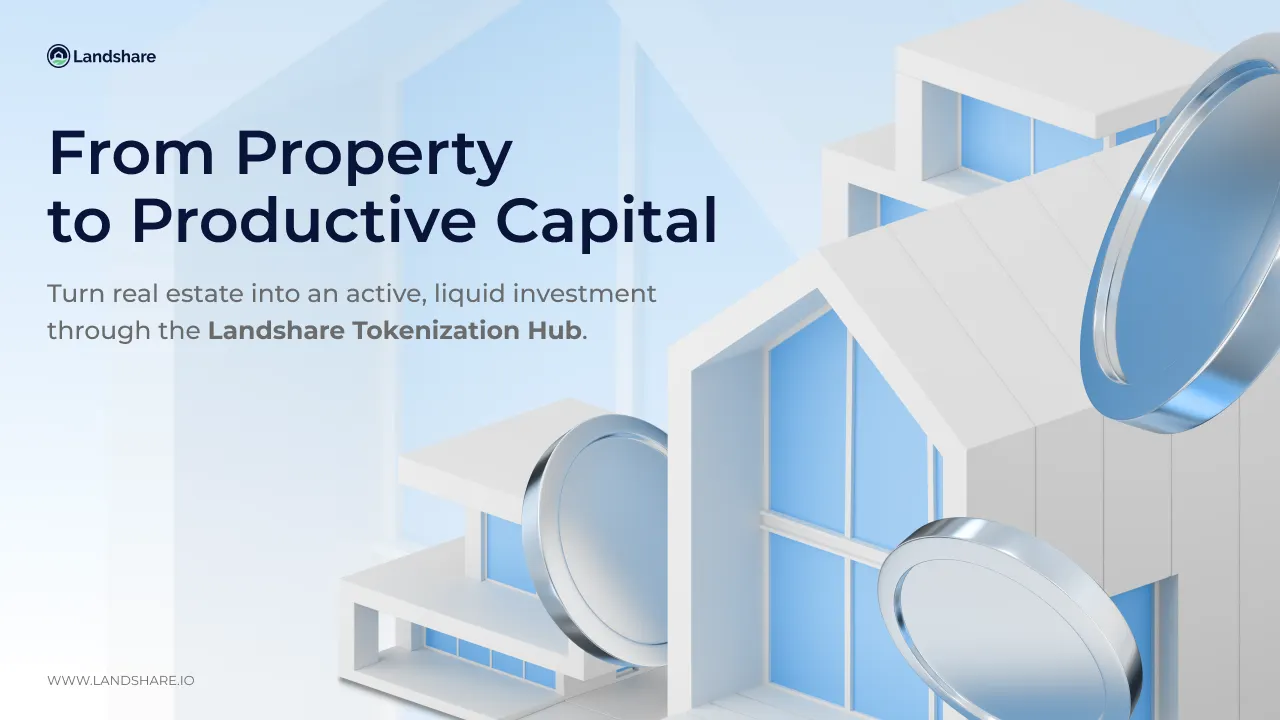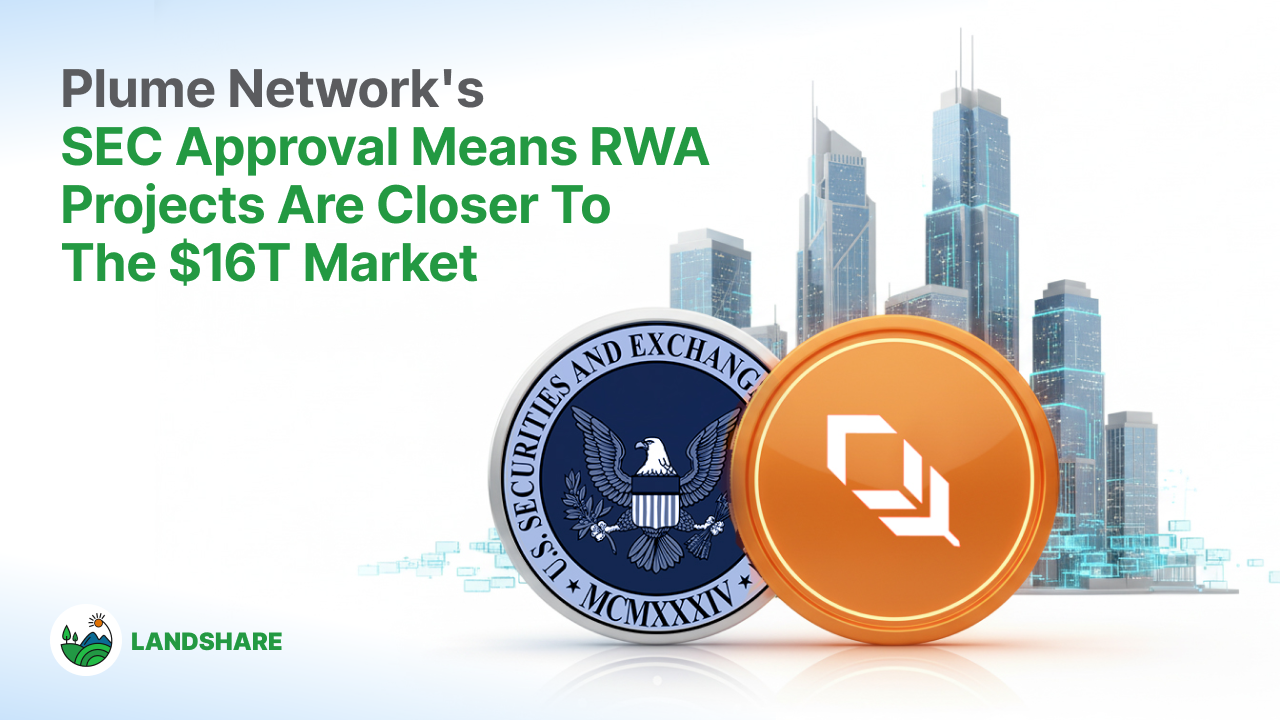How Cross-Chain Systems Pave The Way For Tokenized Economies
Landshare Team

As blockchain technology matures, its potential extends beyond digital currencies into the broader domain of tokenizing real-world assets (RWAs). From real estate to artworks and even intellectual property, the ability to tokenize physical assets has opened up new possibilities for investment, ownership, and exchange.
A Boston Consulting Group report stated that the market size of the on-chain RWA market is expected to hit $16 Trillion by 2030. The massive market size showcases enormous possibilities for growth in the future.

The evolution of technology towards a tokenized economy requires robust cross-chain technologies that facilitate seamless interoperability among diverse blockchain platforms. Here, we will explore what a tokenized economy looks like, why tokenizing real-world assets is transformative, and the crucial role of cross-chain solutions in this burgeoning ecosystem.
What Is Tokenization And How Does It Benefit the Financial Sector?
Tokenization involves converting the rights to an asset into a digital token on a blockchain. These tokens represent ownership or a claim to the underlying asset, allowing them to be bought, sold, or traded on digital platforms. The process democratizes access to investment opportunities and enhances liquidity, transparency, and efficiency in transactions.
Almost every other tangible financial asset can be tokenized today. Thanks to blockchain technology, commodities, currencies, real estate properties, arts, and many other similar assets can be traded in their tokenized versions. The concept of tokenization gained popularity quickly, and a huge amount of credit goes to the benefits it brings to the table.
Advantages of Tokenized Economy Bringing Financial Empowerment

Increased Liquidity: Tokenization can transform traditionally illiquid assets like real estate or art into divisible and easily tradable tokens. This broadens the market and reduces entry barriers for investors, making the asset more tradable and, hence, comparatively more liquid. For example, platforms like Landshare allow investors to purchase fractions of real estate properties as tokens, which they can sell on secondary markets without the need for lengthy and complex real estate transactions. This method greatly enhances liquidity in a market traditionally dominated by high thresholds for entry and exit.
Enhanced Transparency: Using blockchain ensures that all transactions are recorded on an immutable ledger, reducing the risk of fraud and increasing trust. For instance, the buying and selling of real estate properties have traditionally been opaque processes with layers of brokers, inspectors, and legal checks. However, with tokenized real estate transactions, every transaction from initial purchase to subsequent sales is recorded transparently on the blockchain.
Streamlined Processes With Automation: Blockchain technology can automate many of the processes involved in asset management through smart contracts, reducing the need for intermediaries and lowering transaction costs. The process is on-chain and requires no paperwork, which resolves a huge issue inherent to the trade of tangible assets like real estate. A notable example here is Maecenas, which allows users to buy and sell shares in fine art using blockchain. This system eliminates the need for auction houses and brokers, thereby reducing fees and streamlining the entire investment process in art, a market traditionally inaccessible to average investors due to high costs and complex buying processes.
Why Cross-chain is Crucial For RWA?
With the evolution of blockchain technology, the space is filled with many blockchain networks with distinct properties. It was important that these chains connected to each other to create a unified ecosystem, and that’s where Cross-chain systems came to the rescue.
Cross-chain technology enables blockchain networks to communicate and share information, assets, and value. This interoperability allows users to transact across various blockchains without the need to exchange tokens through a central exchange, enhancing the efficiency and scalability of blockchain applications by connecting otherwise isolated networks.
For instance, Polygon (MATIC) offers extensive cross-chain capabilities through its Polygon Bridge, enabling seamless asset transfers between the Ethereum (ETH) blockchain and Polygon sidechains. This feature supports the movement of ERC tokens, NFTs, and other digital assets, facilitating interoperability and scalability. By using Polygon's cross-chain bridges, users benefit from faster transaction speeds and lower fees compared to Ethereum's mainnet, while maintaining robust security.
Arbitrum (ARB) is another example where the Layer 2 scaling solution for Ethereum enhances its cross-chain capabilities primarily through compatibility with Ethereum's network. It allows users to execute Ethereum transactions more swiftly and at a lower cost, without sacrificing security. While it operates on top of Ethereum, Arbitrum doesn't have a native cross-chain bridge like Polygon but leverages Ethereum's security and connectivity.
Cross chain systems bring these benefits to the RWA sector further enhancing its reach. Tokenized assets could move across blockchain networks rather than limited to the native blockchain only. More the reach to multiple blockchains the more users it can cater.
Benefits of Cross-Chain Solutions Within RWA Sector

Broader Market Access: RWA investors benefit from cross-chain systems by gaining access to a wider range of tokenized assets across multiple blockchains, optimizing their investment strategies. This not only broadens their market reach but also enhances liquidity in the RWA sector by including a diverse pool of investors.
Reduced Risk of Fragmentation: Cross-chain technology ensures interoperability across different blockchains, preventing market fragmentation and fostering a more unified ecosystem. Connectivity makes RWAs more accessible and prevents projects within the RWA sector from being isolated on single platforms, promoting broader adoption and integration.
Enhanced Scalability: Cross-chain solutions address scalability challenges that single blockchains face by distributing the load among multiple networks. The utilization of various networks’ strengths leads to more efficient handling of transactions and interactions, significantly enhancing the performance and scalability of RWA applications.
A significant advancement in cross-chain technology is the development of blockchain bridges, such as Polkadot and Cosmos, which aim to connect disparate blockchains to enable asset and data transfer. When the tech is integrated with the RWA sector, it brings significant results.
Cross-chain technology significantly enhances the Real World Asset (RWA) sector by improving liquidity and market access. By enabling seamless transactions across various blockchains, it allows investors to diversify their portfolios with a broader range of tokenized assets, such as real estate or commodities.
The volume of tokenized real estate assets like to increase largely due to improved interoperability provided by cross-chain platforms. This technology also reduces market fragmentation, creating a more cohesive and robust investment landscape, which further attracts a larger pool of global investors, driving the sector's growth and stability.
The Need for Interoperability in the RWA Sector
Cross-chain technology is crucial in the context of RWA because it enables interoperability between different blockchain platforms. This means that assets can move seamlessly across various blockchain networks, enhancing the functionality and reach of tokenized assets. Each blockchain would operate in isolation without cross-chain capabilities, limiting the potential for a truly global and integrated tokenized economy.
As more assets get tokenized on various blockchain platforms, interoperability becomes crucial. Cross-chain technology allows different blockchains to communicate and share information, enabling tokens and assets to move freely across diverse networks.
The Future of Tokenized Economies and Multi Chain Integration
Integrating cross-chain technologies with tokenization efforts will likely redefine asset management and investment across multiple sectors. As regulatory frameworks evolve to accommodate these innovations, we can anticipate a more inclusive and efficient global market landscape.
As assets from real estate to artwork are tokenized, they become more accessible and liquid. Tokenization could unlock trillions in illiquid assets, significantly expanding global investment opportunities. According to a forecast by the World Economic Forum, the tokenized assets market could exceed $24 trillion by 2027.
Integration of multichain systems will enable these tokens to operate across different blockchain platforms, enhancing the functionality and reach of each tokenized asset. This interoperability is critical to building a seamless, efficient global marketplace, bridging diverse economic sectors and geographies, and setting the stage for a more inclusive financial ecosystem.
Conclusion
The potential of a tokenized economy facilitated by cross-chain technology represents a significant shift in how we perceive asset ownership and investment. As this ecosystem continues to evolve, it promises to bring more inclusivity, efficiency, and transparency to the global economy. The journey towards a fully integrated tokenized world is complex and fraught with challenges, but the benefits could redefine the economic landscape for future generations.
About Landshare
Landshare is a platform for tokenizing property in the United States. It allows investors to buy shares in residential properties through blockchain tokens. This method has simplified the investment process and made real estate investment accessible to a broader audience. Landshare merges blockchain technology with the real estate sector by offering tokenized real estate assets on its platform, enabling investments as low as $50 and democratizing access to property investment.
The platform utilizes Real World Asset (LSRWA) tokens to offer investors shared ownership in actual property assets, which is a significant innovation in real estate investment. Landshare's utility token, LAND, has proven its transactional efficiency with the successful sale of four tokenized properties on the Binance Smart Chain (BSC), showcasing its market readiness. By addressing inefficiencies and liquidity challenges in traditional real estate, Landshare is emerging as a pivotal player, providing attractive opportunities for growth and passive income.
Landshare October Recap
Landshare Team
October was a milestone month for Landshare – one that set the stage for the next era of on-chain real estate. From the official Landshare v2 announcement to new ecosystem updates, governance decisions, and exciting community initiatives, we’ve laid the groundwork for a future defined by growth, utility, and innovation.
This month, we introduced the framework that will redefine how investors, property owners, and DeFi users interact with real estate on-chain. Let’s recap the highlights 👇
Landshare v2 Announcement
The official unveiling of Landshare v2 signaled the start of a new chapter – one built around real utility, real yield, and real scalability.
Landshare v2 isn’t just an upgrade. It’s the foundation of a self-sustaining ecosystem where tokenized real estate finally reaches its full potential. The new system transforms stable assets into active yield-generating opportunities, seamlessly connecting traditional markets to DeFi.
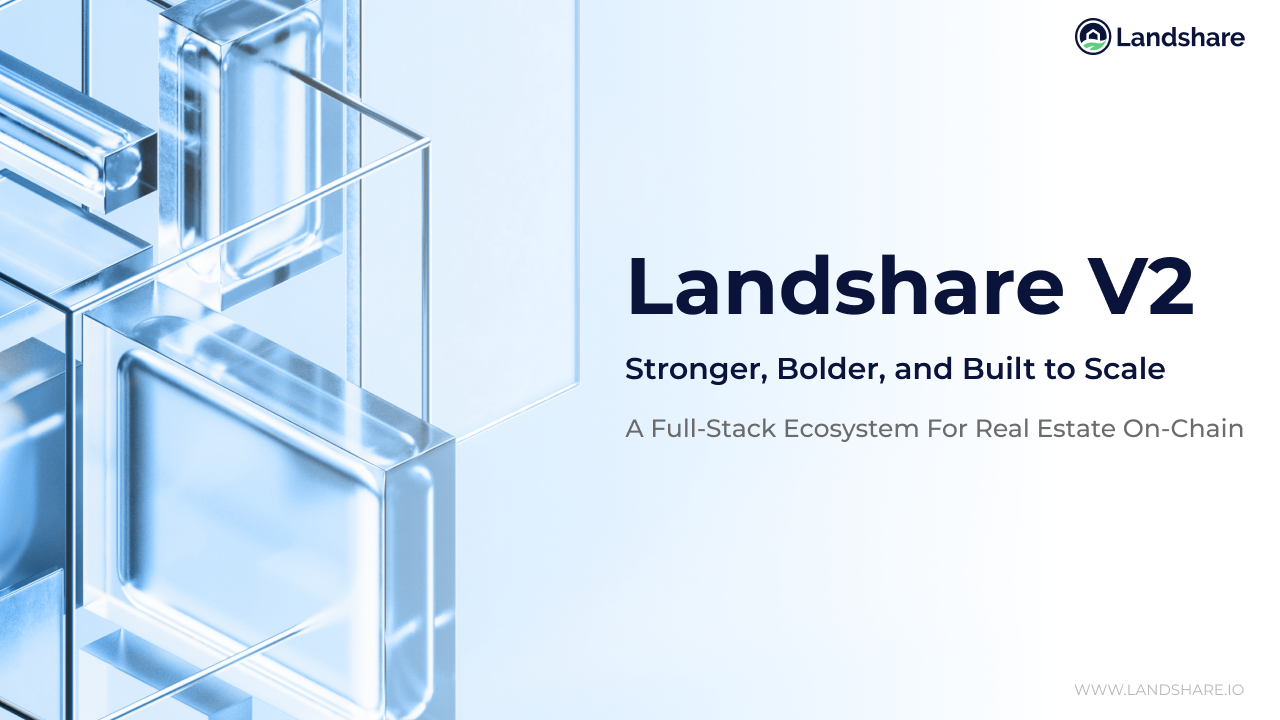
The Three Pillars of Landshare v2
In our follow-up deep dive, we explored the three core pillars that form the foundation of Landshare v2:
- The Real Asset Vault (RAV): A seamless gateway for stablecoin holders to earn real yield backed by tokenized properties.
- The Tokenization Hub: A complete solution for property owners to bring their assets on-chain.
- The DeFi Suite: Tools and incentives that amplify participation and utility across the ecosystem.
Together, these pillars create a self-sustaining growth loop, where every user and property strengthens the entire network.
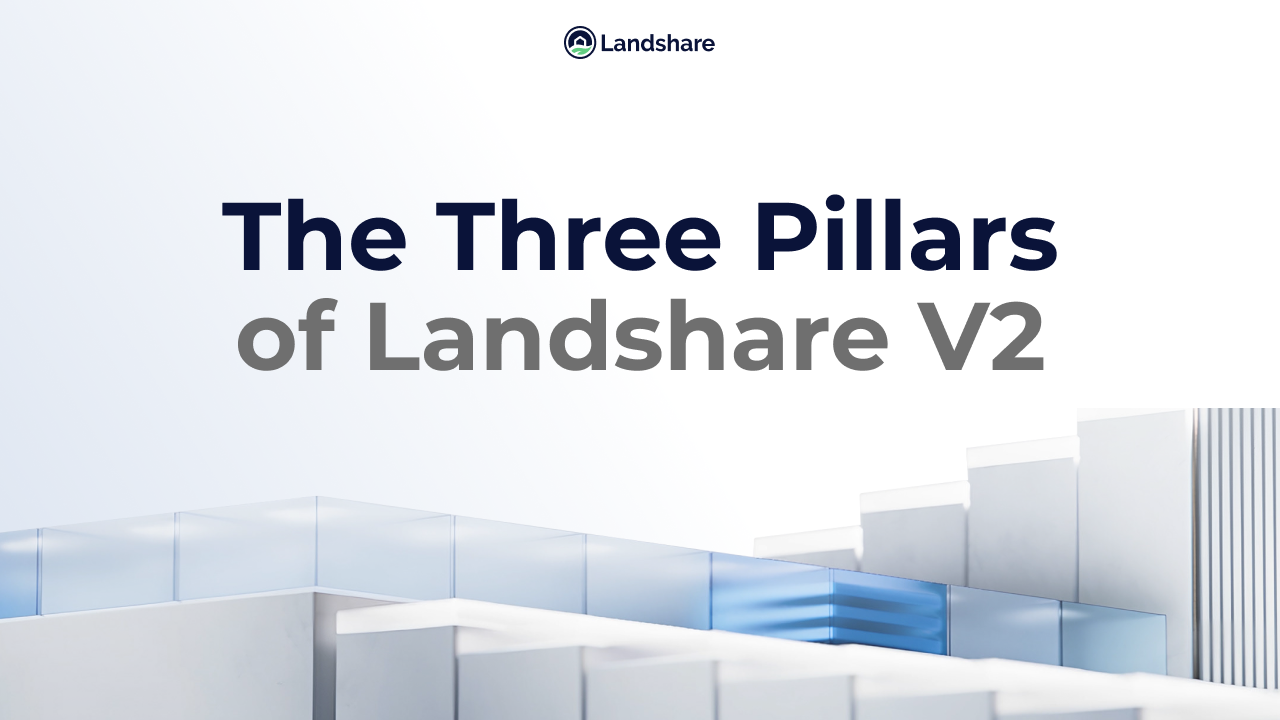
DAO Proposal Passed
In late October, the community voted to reduce LP emissions by 50% across both the LAND–BNB and LSRWA–USDT pools – with the proposal passing at 62.28% in favor.
This important step helps:
✅ Reduce daily LAND inflation
✅ Strengthen token scarcity and price stability
✅ Extend the reward pool lifespan
✅ Encourage long-term liquidity participation
The change will take effect within 48 hours of approval and marks another move toward a more balanced, sustainable economy for Landshare v2.
🗳️ View the full proposal and results
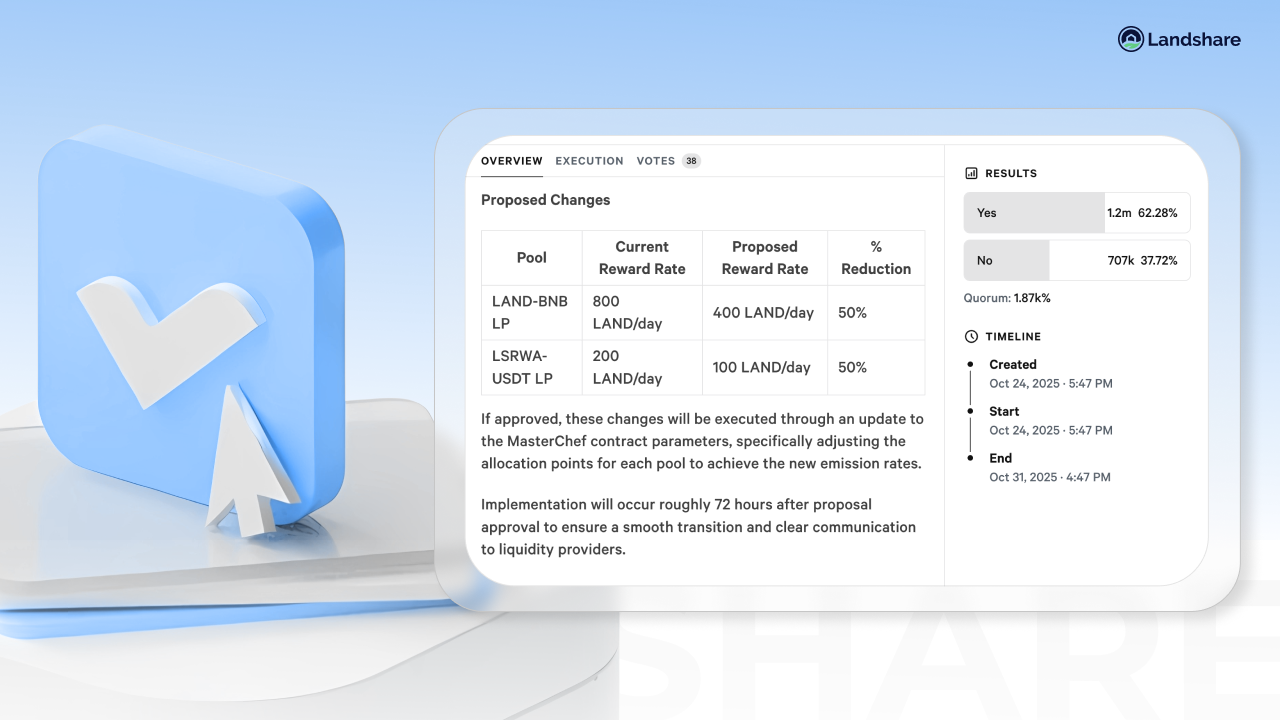
Tokenization Hub Breakdown
We released a comprehensive guide to the Landshare Tokenization Hub, explaining how property owners can now go beyond simple tokenization to access real investors, liquidity, and on-chain utility.
The Hub bridges traditional real estate with blockchain finance – creating a pathway for real-world assets to generate ongoing yield, transparency, and accessibility.

4.5M+ LAND Staked
October also marked another key milestone – over 4.5 million LAND tokens (nearly half of the total supply) are now staked in vaults. This incredible community achievement reflects growing confidence in Landshare’s long-term vision and token utility.
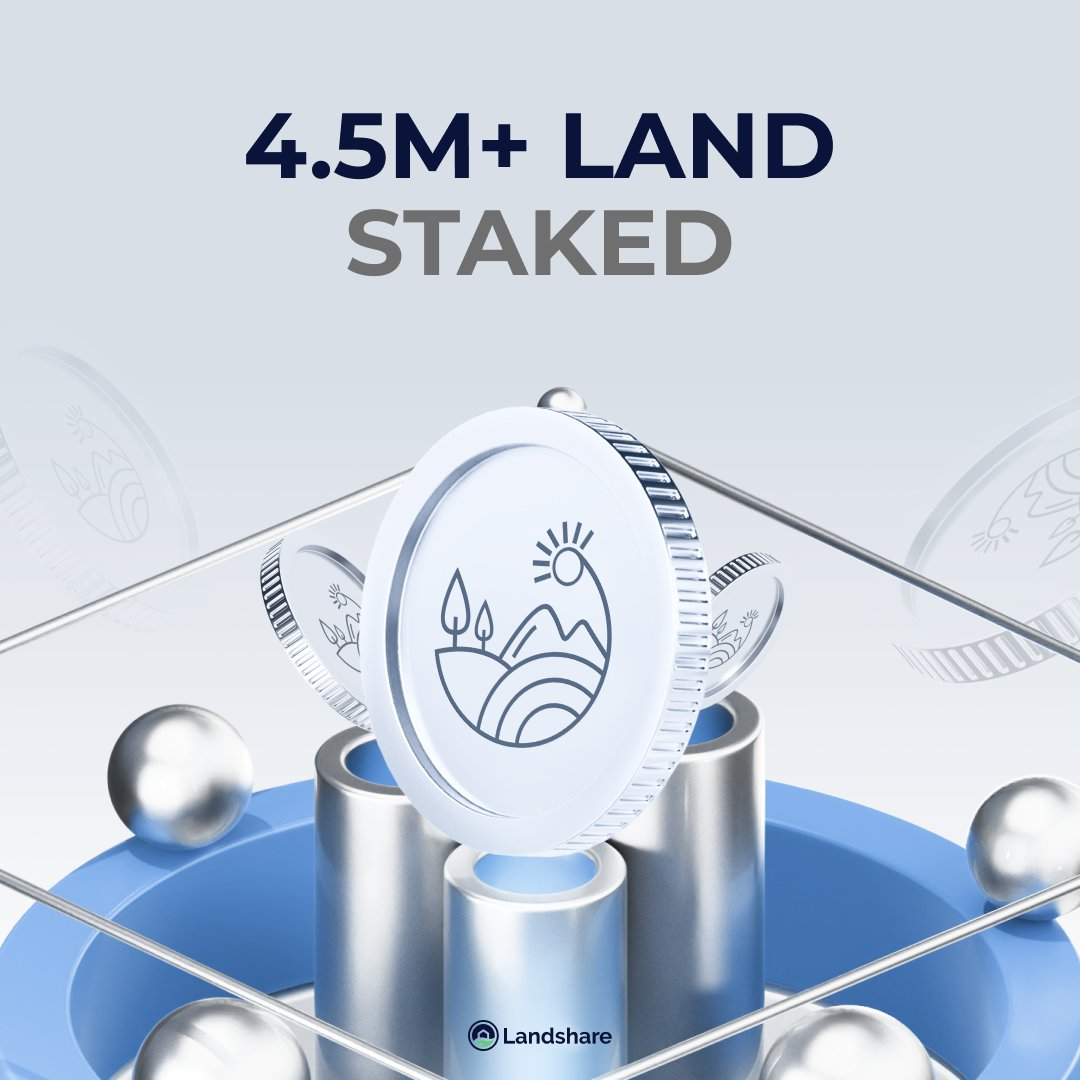
Community Townhall Incoming
We’re excited to announce our next Community Townhall, happening Thursday, November 6 at 12 PM CST or 6 PM CET on X Spaces!
Join Jordan (CEO), Travis (Co-Founder), and Ivan (CMO) as they discuss everything happening with Landshare v2, recent DAO proposals, and take your questions live.
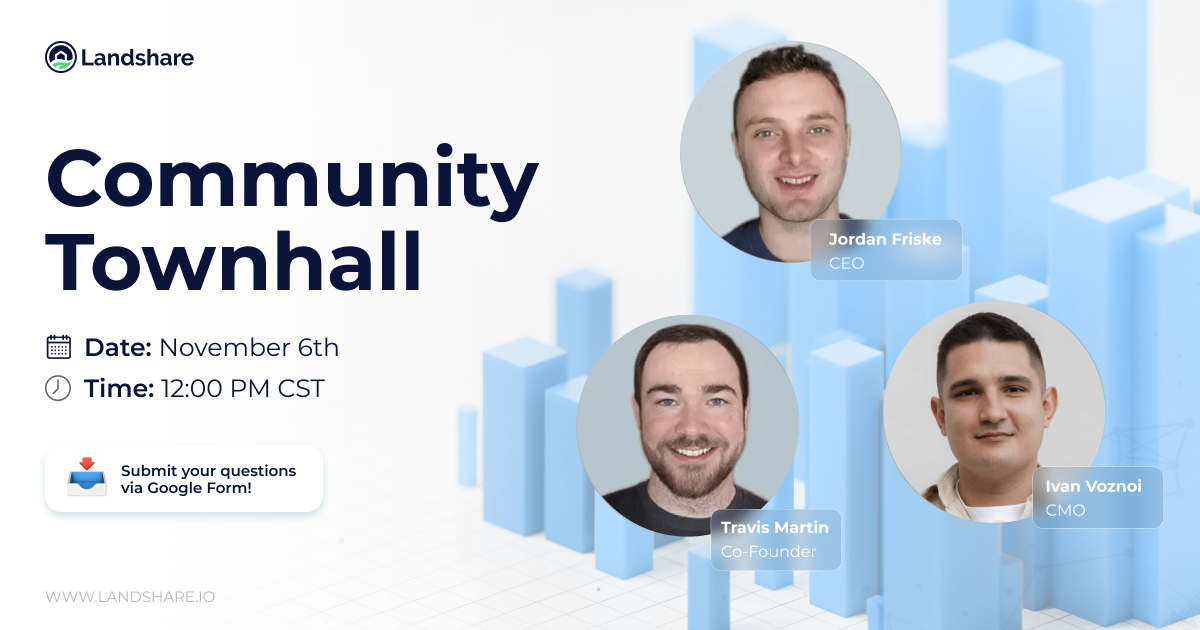
Looking Ahead
With Landshare v2 on the horizon, the foundation is set for a new phase of growth and adoption. In the coming weeks, we’ll be sharing more details on the RAV launch, the Points Campaign, and other major milestones driving our ecosystem forward.
Stay tuned – the future of real estate is being built on-chain, and we’re just getting started.
Tokenization Hub Breakdown
Landshare Team
Real estate tokenization has been a buzzword for years. Yet in practice, most projects have failed to move beyond press releases and empty promises. Too often, blockchain has been used as a veneer to package illiquid or low-quality assets, leaving investors with tokens that serve little purpose and property owners with no meaningful results.
Without investors, liquidity, or secondary markets, tokenization becomes little more than an on-chain spreadsheet — a digital record of ownership that no one can trade or invest in. For property owners, that means time and money spent “tokenizing” without achieving key goals: raising capital, expanding visibility, or unlocking value.
A Smarter Path Forward
For real estate tokenization to truly work, it needs to deliver tangible investment outcomes. After years of building and refining on-chain real estate products, Landshare has developed a model designed to do exactly that.
The Landshare Tokenization Hub transforms tokenization from a passive concept into an active investment process — connecting high-quality properties with real investors, liquidity pathways, and a live blockchain economy.
The Tokenization Hub Solution
Most platforms stop once a token is created. Landshare’s Tokenization Hub goes further , offering a complete pathway for property owners to bring their assets on-chain and immediately engage investors.
Each project is structured for success from day one, with:
- Customized tokenization models tailored to each property
- Transparent fundraising mechanics with defined soft and hard caps
- Built-in integration with the broader Landshare ecosystem
By connecting directly to Landshare’s existing network of investors and DeFi infrastructure, offerings can attract participation as soon as they launch. Once a fundraising goal is met, property tokens are deposited into the Landshare RWA Pool, linking them to ongoing liquidity, yield mechanisms, and secondary market exposure.
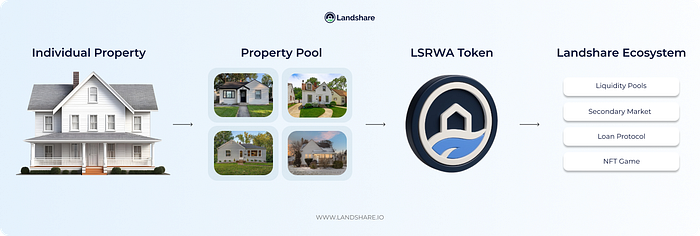
Why This Model Delivers Real Results
Where others leave property owners to manage marketing, compliance, and liquidity alone, the Tokenization Hub handles these as part of a unified process. This integration dramatically increases the likelihood of meeting fundraising goals and sustaining long-term engagement.
Integration with the Landshare RWA Token (LSRWA) is central to this model. Rather than isolated tokens with no market, each property becomes part of a shared, liquid environment that generates yield and investor participation. Individual assets can still be represented, extracted, or traded independently when needed.
For example, a multifamily property owner might tokenize 20% equity to raise $500,000 on-chain, connect the asset to the RWA Pool for ongoing yield, and maintain full transparency for investors — all within a compliant, accessible framework.
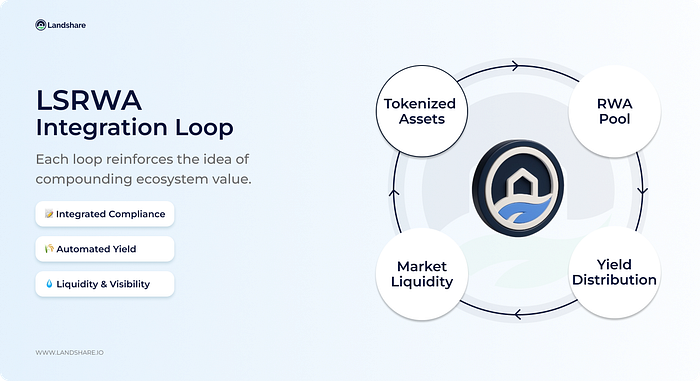
How It Works
- Tokenize the Property: Landshare collaborates with property owners to create a digital representation of equity, income rights, or hybrid participation.
- Launch the Offering: The property is listed on the Tokenization Hub with defined terms, caps, and transparent investor access.
- Fundraising & Validation: Investors participate directly on-chain. Once the soft cap is reached, funds are secured and the offering is finalized.
- Ecosystem Integration: Tokens are deposited into the Landshare RWA Pool, and investors receive LSRWA tokens representing pooled value and yield potential.
- Ongoing Value Creation: Property owners gain lasting benefits through liquidity, visibility, and investor engagement. As new assets are added to the pool, owners can rebalance between equity and cash, making real estate a more dynamic and liquid asset than ever before.

Built for Real-World Impact
The Landshare Tokenization Hub is more than a technical service — it’s a complete ecosystem designed to make real estate investment active, liquid, and accessible.
For property owners, it offers a streamlined way to raise capital and connect with global investors.
For investors, it provides exposure to yield-generating, on-chain assets backed by transparent real-world value.
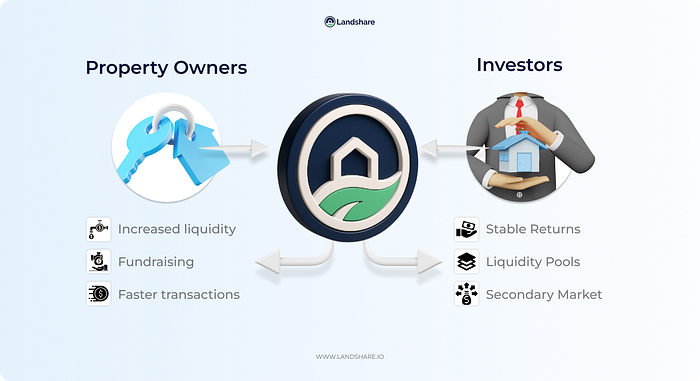
In an industry crowded with static tokens and overhyped promises, the Tokenization Hub delivers what tokenization was always meant to achieve — real outcomes, real liquidity, and real-world results.
🏡 About Landshare
Landshare is a tokenized real estate ecosystem that enables seamless investment in real-world assets on the blockchain. With Landshare, you can own a share of a real-world property simply by holding our RWA Tokens ($LSRWA). Our platform offers a secure, transparent, and efficient way to invest in real estate without traditional barriers.
- Website: landshare.io
- Twitter: @Landshareio
- Community: t.me/landshare
Plume Network's SEC Approval Means RWA Projects Are Closer to the $16T Market
Landshare Team
On October 6, Plume Network announced on its social media that it had been approved to be an SEC-registered transfer agent. This is a big milestone for the RWA industry, signaling that the traditional financial system is welcoming tokenized assets.
Transfer agents basically manage important back-end work and are the official record-keepers for securities issuers. So, essentially, they maintain shareholder registries, record ownership changes, issue certificates, and handle other corporate actions.
Plume’s approval means these critical functions can now be managed on-chain for tokenized securities. This is a pretty big deal, as it gives Plume and its users formal regulatory standing under U.S. law for on-chain securities.
Experts believe that this approval can boost the global RWA market, and top players like Landshare can benefit from it due to the increased regulatory clarity.
Why is the SEC’s Approval Important for Plume Network?
So, first, understand the roles of a registered transfer agent to get a better understanding of its importance.
In traditional finance, a transfer agent is usually a company or bank that tracks who owns a company’s securities and facilitates trades. They ensure every share transfer, stock split, or dividend payment is accurately recorded and reported. Now, let’s understand how this traditional role will work in the world of blockchain.
Post Link
By replicating these roles on-chain, Plume’s platform can securely log every token sale or dividend distribution in an immutable ledger, while also syncing with regulators. As Plume explains, its transfer-agent protocol will “link cap tables and reporting directly to SEC and DTCC systems”.
This means tokenized equity and debt on Plume can behave like traditional securities, but will be managed better with the help of blockchain technology.
Plume’s CEO believes that this regulation “exists to protect investors’ rights as shareholders,” and Plume’s on-chain solution is meant to simplify the processes under that framework.
Its Impact:
Experts believe that the registration will open up several doors for the RWA market because of the ‘trust factor’. Being registered means there are no risks as far as legality is concerned. When an industry or its top player receives a green flag from the government regulatory agencies, institutional capital follows.
BlackRock, Fidelity, JP Morgan, etc., are already looking to build blockchain-based products. This will further invite them to join the RWA growth story and possibly super-boost it.
Moreover, another important benefit is that tokenized securities can now flow through compliance obstacles. This means issuance times can be cut from months to weeks with the help of smart contracts. Similarly, on-chain dividends and ICOs can enjoy the same legal protections as Wall Street offerings.
What Does This Mean For The RWA Market?
Plume’s win comes at a time when analysts are already forecasting a massive growth in tokenized RWAs over the next decade. Institutions now value tokenization as a way to digitize everything from private credit to real estate. Also, the numbers are pretty optimistic as well.
A Boston Consulting Group report estimated the global asset-tokenization market could reach about $16.1 trillion by 2030. The industry has already grown by almost 380% in the past three years. To put things into perspective, today’s entire crypto market cap is smaller than those figures. Even some of the more conservative forecasts still show multi-trillion growth.
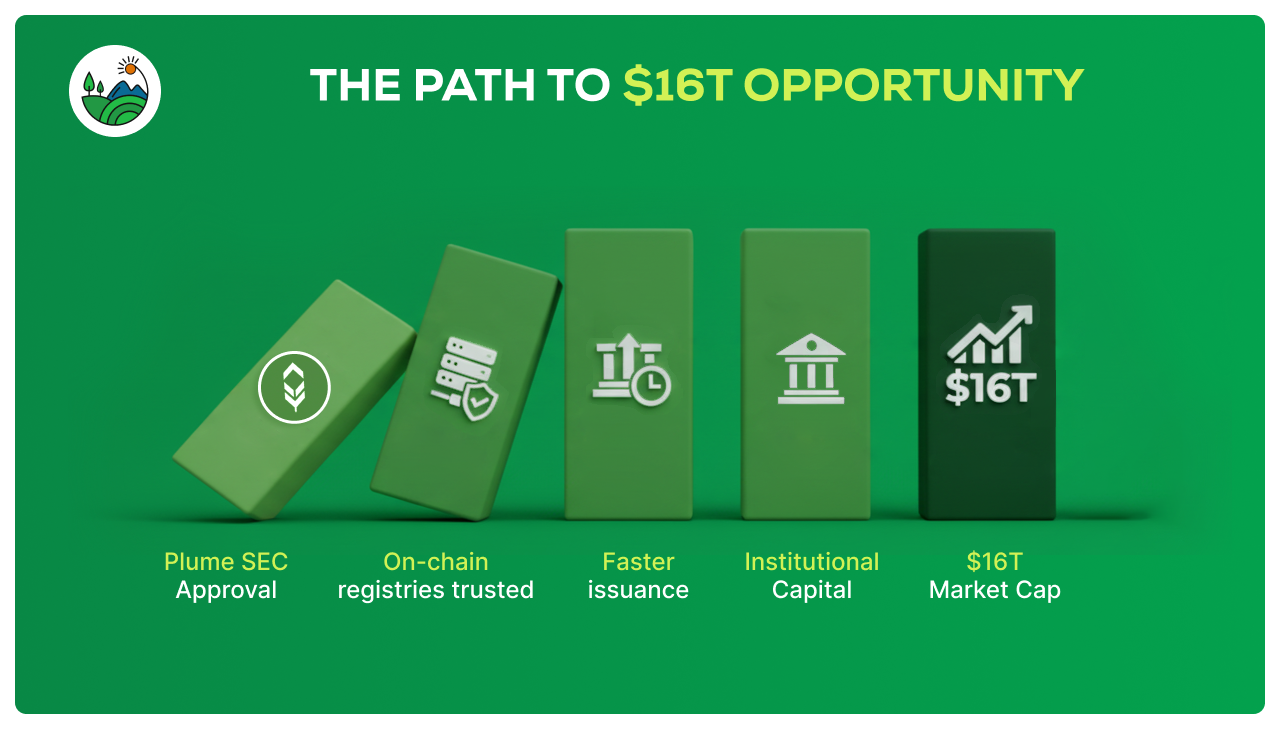
If these estimates can materialize in the days to come, RWA is well-positioned to be one of the largest markets in the world of modern finance.
Moreover, the external conditions are favoring this industry. Governments and regulators worldwide are creating proper frameworks. For instance, Asia-Pacific markets are running pilots for digital bonds and crafting standardized rules for security tokens.
These developments and the excitement of retail investors in this category build confidence that the $16T opportunity is actually very real.
How Will Landshare Benefit From This?
Landshare stands at the forefront of benefiting from this opportunity because of its early entry and real-world utility. This is very important as institutions seek new projects that have use cases that can help them capture a considerable market share.
Moreover, Landshare already operates as a compliant RWA platform. For instance, each Landshare RWA Token (LSRWA) is a security token representing fractional shares of a U.S. real estate portfolio, and buyers must pass KYC/AML checks.
The fact that regulators are now approving on-chain transfer agents shows the industry’s efforts are finally paying off. Here are some more factors that can help Landshare be one of the top RWA contenders:
1. Regulatory Credibility: Plume’s SEC status essentially means that tokenized securities can operate within established rules. Landshare’s approach aligns with these principles. So, investors can be assured that their projects sit within a legal framework designed to protect shareholders.
2. Investor Confidence: Every step toward clear regulation lifts confidence. The recently passed GENIUS Act, the SEC’s staff statements on liquid-staking, and the Trump administration’s overall outlook towards the crypto market have been fairly positive.
Similarly, Plume being approved as a SEC-registered blockchain transfer agent tells retail and institutional investors that projects like Landshare aren’t mere experiments. They’re rather a part of a regulated financial evolution.
Moreover, it means regulators see value in on-chain tokens, and that kind of signal helps legitimize the space Landshare operates in.
3. Landshare’s Own Progress: Landshare isn’t about hype. It is rather focused on delivering value from day one. The project has already sold four houses on the BNB chain. It is also providing consistent rental returns to the investors in its properties.
Moreover, the team remains focused on delivering stable, compliant returns from real estate growth.
Conclusion
So, now we know that the recent news was about more than just Plume Network being approved by the SEC to be a transfer agent. It rather has a much bigger impact on the RWA market as a whole.
While the industry continues to grow, for Landshare, it is the right time to innovate further and add more value to consumers’ lives.






